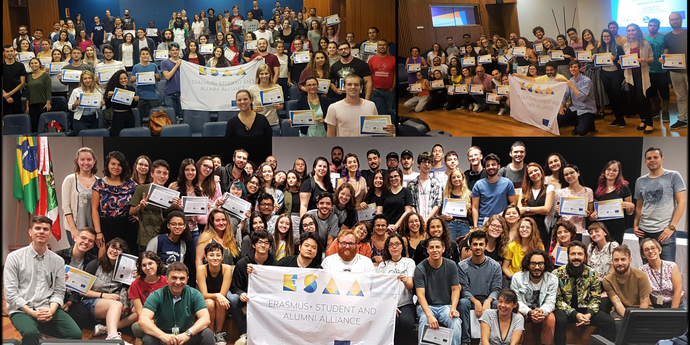News
#HowToErasmus+ Workshops in Brazil
Eight capacity building sessions attracted a total of 342 participants during April and May 2019, in Brazil. The project, led by an Erasmus Mundus Association member, focused on enabling participants to build stronger applications for Erasmus+ opportunities.
HowToErasmus+ Workshops in Brazil
The #ESAAeu funded project entitled "#HowToErasmus+ Workshops in Brazil" took place during April and May 2019. It consisted of eight capacity building sessions with a total of 342 participants. The project's aim was to enable potential candidates to create convincing applications for Erasmus+ opportunities. The project focused particularly on the Erasmus Mundus Programme and on how to use the EURAXESS Portal.
The workshop was organized by the trainer Tiago Welter, a member of the Erasmus Mundus Association. The three host universities were: (1) State University of Santa Catarina (UDESC), (2) Federal University of Santa Catarina (UFSC), (3) Federal Institute of Santa Catarina (IFSC).
Each workshop started with a presentation of the trainer about Erasmus+ opportunities, focusing on the Erasmus Mundus Programme. The presentation was about providing practical tips on how to deal with common challenges faced by applicants. In the second part, the participants were invited to reflect on their personal goals and what challenges they have faced when preparing their application for Erasmus+ opportunities. Then the group focused on discussing possible strategies to maximize the chances of success. The trainer's suggestions to participants were based on real cases and sharing tips acquired from current and previous Erasmus+ scholarship holders. He mainly drew from his experience of interacting with over 250 different current and past students of the Erasmus Mundus programme.
You can find more about the project via Facebook, via the hashtag #HowToErasmus+ or via this link: http://bit.ly/erasmusworkshop
1. "#HowToErasmus+ Workshops in Brazil" Project Results:
The project was considered very successful in quantitative and qualitative terms. A total of 342 people participated in the workshops, corresponding to the goal of reaching between 200 and 400 participants. The feedback received from the participants was also very positive. They mentioned that the sessions motivated them to apply for study and research Erasmus+ opportunities. Furthermore, the participants mentioned that now they have "an idea of how to find the opportunities and what are the next steps to prepare an application". Thus, the participants got to analyse their goals and improve their skills related to preparing for and working on applications for international selection processes. These elements, such as language proficiency certificates and recommendation letters, do not apply only to Erasmus+ programmes application processes. Therefore, these capacity building sessions are of great relevance and strengthened the project's positive impact.
Furthermore, most of the workshop participants had never heard of the Erasmus Mundus programme before, not to mention being aware of the Erasmus+ Student and Alumni Alliance (ESAA) and its allied organizations. Hence, the project also helped to promote the Erasmus+, ESAAeu and EMA brands.
2. Links to Erasmus+ Opportunities
If you are a non-EU national seeking to find European Union funded opportunities for study or research, here are two helpful links:
2.1. Erasmus Mundus Programme: Portal with the list of over 100 different Erasmus Mundus Master courses available: http://bit.ly/emcatalogue
2.2. EURAXESS Portal - thousands of available PhD, Post-Doc, and Research opportunities: http://bit.ly/erasmusjobs
3. Some of the common topics debated during the #HowToErasmus+ Workshop:
Here are some of the common challenges and possible solutions discussed by the #HowToErasmus+ Workshop participants:
3.1. Language Proficiency Certificates
Most of the participants (about 95%) still do not have a language proficiency certificate, such as IELTS or TOEFL iBT. Participants pointed out that one should start preparing for such exams as early as possible.
3.2. Recommendation Letters
Who writes them? Candidates should not hesitate to ask professors or previous bosses for such a letter. They can also ask for two versions of it: one letter which corresponds to the specific purpose of the candidate's application and a more general one which can be used for other future opportunities.
3.3. Getting tips from online communities and portals
Some online portals are a good gateway to find first tips about Erasmus+ opportunities and to debate on first doubts. In Brazil, one good example is the "Erasmus Mundus no Brasil" group (www.facebook.com/groups/22831448965/ ) which has over 14.000 members and is managed by the Erasmus Mundus Association, via its Country Representative, Gisele Branda.
4. Our Thanks
We are very grateful to those who participated and supported this project in Brazil. We send out thanks to the host institutions, namely: the International Office of FAED/UDESC (in particular Dr. Fernando Coelho), the SINTER International Office of UFSC (in particular Mr. Guilherme Carlos), the Papo Sério Project at NIGS/UFSC (in particular Professor Alexandra Alencar), the CARI/UFSC Students' Union, and the External Relations Office of IFSC (in particular Professor Maurício Gariba Júnior).


